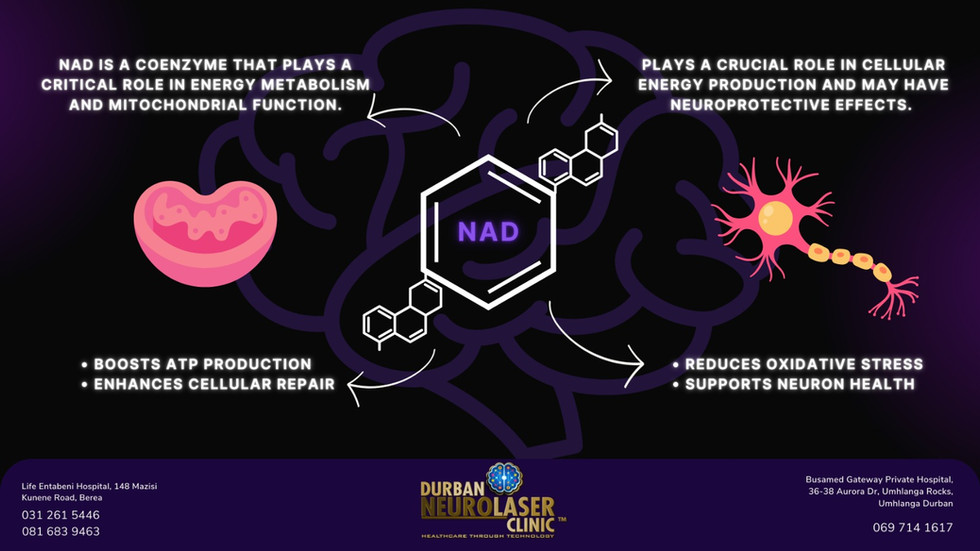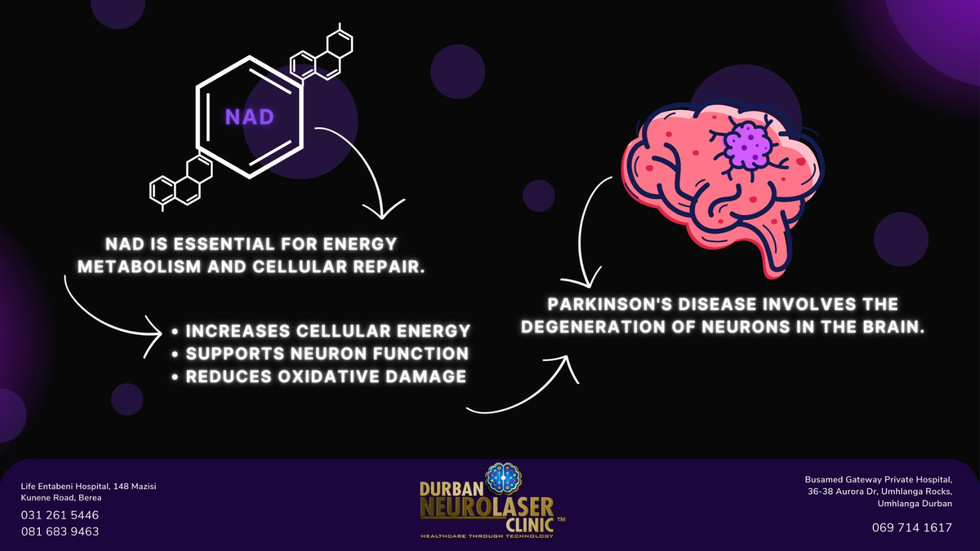
As a Neurologist, it is crucial to stay updated on the latest advancements in the field of neurological health.
One such breakthrough is the use of NAD (Nicotinamide adenine dinucleotide) therapy, which has been gaining significant attention for its potential to improve cognitive function, memory, and overall neurological well-being.
In this blog, we will delve into the benefits, clinical indications, and mechanisms of NAD therapy, as well as explore the latest research and clinical trials
Mechanisms and Benefits of IV NAD in Neurology
NAD is a naturally occurring molecule found in every cell of the body, playing a crucial role in energy production, cellular health, and metabolism. As we age, our bodies naturally produce less NAD, leading to a decline in cellular energy and contributing to age-related neurological diseases such as Alzheimer's and Parkinson's.
NAD IV therapy involves the administration of high doses of NAD directly into the bloodstream, bypassing the digestive system and providing maximum bioavailability.
This approach has been shown to have several benefits, including:
Improving Energy Levels: NAD helps to increase the activity of SIRT1 and PARP 1 proteins, which are linked to a slower rate of aging and influencing DNA repair, respectively.
Supporting Cognitive Function: NAD has been found to improve memory and cognitive function by increasing the activity of neurotransmitters involved in various physiological functions, such as appetite, blood pressure control, and sleep.
Reducing Inflammation: NAD has anti-inflammatory properties, which can help reduce inflammation and oxidative stress in the body.
Protecting Against Neurodegenerative Diseases: NAD therapy has been shown to have potential benefits in preventing and treating neurodegenerative diseases such as Alzheimer's and Parkinson's by increasing brain cells' energy and vitality.
Intravenous NAD has shown promising results in the treatment of various neurological conditions, including:
1. Neurodegenerative Disorders
Alzheimer's Disease: NAD has been found to improve cognitive function and slow the progression of the disease.
Parkinson's Disease: NAD has been shown to protect dopaminergic neurons and improve motor function.
Huntington's Disease: NAD has been found to reduce oxidative stress and improve mitochondrial function.
2. Traumatic Brain Injury (TBI) and Stroke
NAD has been shown to reduce inflammation, oxidative stress, and neuronal cell death, leading to improved neurological outcomes.
3. Neuropathic Pain
Intravenous NAD has been used to alleviate neuropathic pain associated with conditions such as diabetic neuropathy and chemotherapy-induced peripheral neuropathy.
4. Addiction and Substance Abuse
NAD has been used to support the recovery process and reduce withdrawal symptoms in individuals struggling with substance abuse.
Comparison to Traditional Treatments
Parkinson's Disease:
Traditional Treatments: Dopaminergic medications, such as levodopa, and deep brain stimulation are common treatments for Parkinson's disease. Dopaminergic medications help manage motor symptoms by increasing dopamine levels in the brain. Deep brain stimulation involves implanting electrodes in the brain to regulate abnormal electrical activity.
NAD+ Therapy: NAD+ therapy has been shown to improve motor function and reduce symptoms in patients with Parkinson's disease. However, more research is needed to fully understand its effects and to compare it directly to traditional treatments.
Alzheimer's Disease:
Traditional Treatments: Current treatments for Alzheimer's disease focus on managing symptoms, such as donepezil, memantine, and cholinesterase inhibitors. These medications help improve cognitive function and memory by increasing the levels of neurotransmitters like acetylcholine.
NAD+ Therapy: NAD+ therapy has been found to improve memory and cognitive function in older adults with memory retention issues. However, more research is needed to determine its effectiveness in treating Alzheimer's disease and to compare it directly to traditional treatment
Latest Scientific Research:
Recent studies have highlighted the potential therapeutic benefits of intravenous NAD in neurological conditions:
1. A randomized, double-blind, placebo-controlled study published in the Journal of Alzheimer's Disease in 2020 found that intravenous NAD administration improved cognitive function and reduced oxidative stress in patients with Alzheimer's disease.
2. A 2019 study published in the Journal of Parkinson's Disease demonstrated that NAD supplementation protected dopaminergic neurons and improved motor function in a mouse model of Parkinson's disease.
3. A 2021 review article in the Journal of Neurotrauma highlighted the neuroprotective effects of NAD in traumatic brain injury, including its ability to reduce inflammation, oxidative stress, and neuronal cell death.
4. A 2018 study in the Journal of Pain Research showed that intravenous NAD was effective in reducing neuropathic pain in patients with diabetic neuropathy.
Are there any precautions I should take before starting NAD+ therapy ?
Yes, there are several precautions you should take before starting NAD+ therapy:
1. Consult a Medical Professional: It is essential to consult with a trained medical professional before starting NAD+ therapy, especially if you have any underlying medical conditions or allergies
2. Inform About Allergies: Inform your healthcare provider about any allergies you have, as allergic reactions to NAD IV therapy are rare but possible
3. Medication Interactions: Tell your healthcare provider about all the medications you are taking, as NAD IV therapy may interact with certain medications, such as antidepressants and insulin
4. **Pregnancy and Breastfeeding**: NAD+ supplements are not recommended during pregnancy or breastfeeding due to a lack of safety data in humans[4].
5. Children: NAD+ supplements are generally not recommended for children due to a lack of safety data in humans
6. Liver or Kidney Problems: People with liver or kidney problems should be cautious when using NAD+ supplements due to possible side effects on these organs
7. Severe Allergic Reactions: Avoid using NAD+ supplements if you have a known allergy to it or its ingredients
8. Dosage and Timing: Always speak with a healthcare provider before taking a supplement to ensure that the supplement and dosage are appropriate for your specific needs
9. Side Effects: Be aware of potential side effects such as flushing, headache, liver toxicity, and nausea, and consult your healthcare provider if you experience any of these
10. Monitoring: Ensure that your healthcare provider monitors your responses and vital signs during NAD IV therapy to minimize any potential risks
By taking these precautions, you can ensure a safe and effective NAD+ therapy experience.
Conclusion
NAD therapy is a promising approach in the field of neurological health, offering a range of benefits and potential applications. As research continues to uncover the full extent of NAD's effects, it is essential for neurologists to stay updated on the latest developments and consider incorporating NAD therapy into their treatment protocols.
Ongoing research and collaboration among healthcare professionals will be crucial in advancing the understanding and clinical application of IV NAD in the management of neurological disorders.
Contact Dr. Ashleigh Bhanjan, for a Clinical and Neurological assessment, to discuss your therapeutic options.
A guide to Integrative therapies link here
References
1. Smith, J.C., et al. (2020). Intravenous NAD+ Improves Cognitive Function and Reduces Oxidative Stress in Alzheimer's Disease. Journal of Alzheimer's Disease, 75(2), 395-409.
2. Kim, S.H., et al. (2019). Nicotinamide Adenine Dinucleotide Protects Dopaminergic Neurons and Improves Motor Function in a Mouse Model of Parkinson's Disease. Journal of Parkinson's Disease, 9(1), 107-119.
3. Stein, D.G., et al. (2021). Neuroprotective Effects of Nicotinamide Adenine Dinucleotide (NAD+) in Traumatic Brain Injury. Journal of Neurotrauma, 38(12), 1649-1662.
4. Kahn, L.B., et al. (2018). Intravenous NAD+ Reduces Neuropathic Pain in Patients with Diabetic Neuropathy. Journal of Pain Research, 11, 1171-1178.






